All Volunteer, All Heart from Binky Patrol
501c3 Tips
Episodes
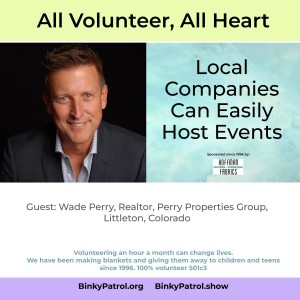
Wednesday Aug 31, 2022
EP17 How a Local Businesses Can Easily Host a Charity Event
Wednesday Aug 31, 2022
Wednesday Aug 31, 2022
Wade Perry joined Susan after his first annual Coventry Summer Jam in Littleton, Colorado. He goes through the expense and return of this event. The expense is all under marketing, the return is beyond what he had hoped. This event benefitted the School of Rock in Littleton. They raised enough for ten scholarships. Seeing and hearing everyone enjoying this event in their local park was the best gift. Listen to this to hear how a small business or two can align with a charity to give so much to a community overall, and directly to a charity. It wasn't that hard. They are already talking about next year.
Wade offered to talk to anyone who wants more information on how they can host a similar event in their community. Susan Finch is also available to anyone who wants to brainstorm events. Wade can be reached [email protected].
Here are the steps Wade recommends.
1. Find a local quality band that has a danceable set.
2. Local food trucks.
3. Partners who may be willing to share the expense.
4. A local charity you are truly attached to - you have to be all in.
5. Charity is always the focus. You are in the background.
6. Best to keep it a smaller community event under 500 people.
7. Pull permits.
Plan this starting at least six months out.
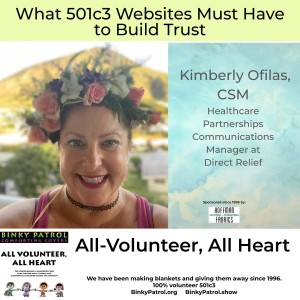
Wednesday Aug 10, 2022
EP14 What a 501c3 Website Must Have to Build Trust
Wednesday Aug 10, 2022
Wednesday Aug 10, 2022
There are 6 elements a 501c3 orgs website must have to build trust and give a clear picture of the impact of the organization. Listen to this episode for the list
Kimberly Ofilas, Healthcare Partnerships Communications Manager at Direct Relief joins us to talk about the must-haves for a non-profit organization's website to build trust and credibility, as well as clarity of the organization's mission. Kim's experience with non-profits and many segments stretches back to when Binky Patrol started. Her current position with Direct Relief has allowed her heart to be full. Direct Relief works to equip health professionals in resource-poor communities to meet the challenges of diagnosing and caring for people in need.
List includes a privacy policy, about page with actual directors and officers listed, clearly state what you do first thing on the home page, your 501c3 number, links to charity review sites such as Guide Star, stories showing what you do to have impact.
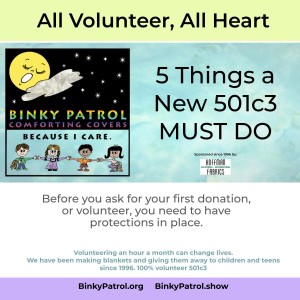
Wednesday Aug 03, 2022
EP13 5 Things a New 501c3 Needs to Do to Protect Themselves
Wednesday Aug 03, 2022
Wednesday Aug 03, 2022
When people have the idea to start a non-profit, they usually know some of the steps, especially if they've had experience in a board role before. We learned a lot when we started Binky Patrol and wanted to help newer non-profits avoid mistakes that could cost them their reputation, sponsors, and ability to grow.
VERIFY you have set up your 501c3 correctly at the federal and state level. Not doing this can cause all sorts of issues if you are not truly a non-profit but have been accepting donations. Have your documentation from both the feds and state handy in a folder on your computer or a shared drive. This includes your articles of incorporation and bylaws.
Register and submit your organization to sites such as GuideStar for credibility. This includes adding them to various directories and other organizations such as the United Way, Benevity, and other foundation sites that work with companies on matching funds. You will need an active website and should have an email with that domain name. You will have to pay for it. Google is the best mail service.
Register your site with TechSoup to get discounts on software and other items to run your organization. It has saved us a ton.
GET A REAL CPA! You need someone familiar with non-profits and compliance. Do your due diligence and check out their reputation, and contact other 501c3s they handle. This will make all the difference. They can help you with the handbook and other items to get started. Protect yourself, your reputation, and that of your great volunteers.
Create a handbook for volunteers that you review regularly. I'm not sure what Binky Patrol would do without our handbook we started our first month.
Bonus items if you are going to have regional locations.
If you will have regional chapters, how do you set them up? HIGHLY recommend not allowing ANYONE to set up a bank account. It all runs through your corporate office. You are accountable for ALL activities of each chapter. One bad apple can ruin your efforts and organization.
How often will you check in with them?
Do they have a central location for press kits, and materials to promote their local chapter?
If you donate to another organization or individuals, check them out to ensure they are what they say they are. Just as your site should have your 501c3 number, financials available upon request, and board members, so should these organizations you partner with or donate to.
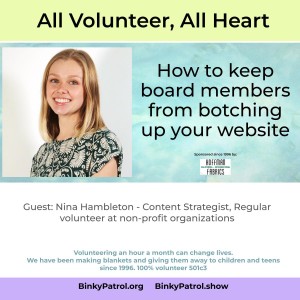
Tuesday May 24, 2022
EP3 Tips for Rotating Boards
Tuesday May 24, 2022
Tuesday May 24, 2022
People volunteer for different reasons. After doing this for more than 25 years, Susan Finch has seen a lot of motivators. One is the need make their mark to be seen, heard, to feel important. That can still work for an organization, but without some guidelines and roadblocks in place, it could result in a website going down, social media debacles, embarrassment, loss of sponsors and volunteers. Tune in with Nina Hambleton and Susan as they go over some simple, helpful tips to prevent this and still allow your incoming volunteers and board to make their mark in the most positive way.
I want to take this opportunity to talk a little bit about the nature of nonprofits and we're well-meaning volunteers can kind of botch stuff up. This is more coming from our experience, what I've experienced with my clients, because in addition to running, Binky Patrol, I have a marketing firm, Susan Finch Solutions that takes care of all online pieces for companies, including their website, social media domains, podcasts, and more. And I've seen a lot of organizations have their online presence, social media websites, everything gets botched up because of well-meaning volunteers, interns, or those wanting to make their mark. You know, the ones at the ego, it's kind of the nature of nonprofits and business organizations. They have a rotating board of directors and officers, and many times, well-meaning volunteers and board members want to help and change things.
They want to bring what is familiar to them and make changes to create their mark. And then they leave the next year and in their awake as a mishmash of methods code to that incoming volunteers and board members have to detangle undue redo, fix rebuild.
Here are a few suggestions to keep this debacle from happening in your organization. It's never too late to do this. If you don't have it in place yet, start now document this stuff and create a guide to onboard volunteers and board members, two different guides. And this can include a style guide. What fonts do we use? What colors here's our logo. These are the right logos. Don't please don't do this. Please don't say these words, please do this. And an explanation of the tools used for the website.
If it's WordPress, that would mean plugins. Why you use it, the theme that you use, and that you don't want people changing those. And the easiest way to do that is to not give them access, to be able to make those changes. You can't just make them all admins and let them do everything. Make them contributors. If they want the bigger stuff done, they can send you a request or something. Same with social media. You don't want them to be able to invite all their friends or whoever they want to, to be able to contribute to your stuff and give them access, limit it with all your marketing material, same thing we use Drive, you know, a nice central location for all of our templates that we use. And so we allow people to use those because drive like it has versioning, which is super cool.
So if somebody breaks something or botches it up, I can go back a couple times to where it wasn't broken. And we limit admin access to most things I know for the Binky Patrol website, it's not in WordPress yet. It's in, some other proprietary content management system and there are only three super admins that can make big changes. Everybody else is a user and they are locked down to only be able to edit their pages, and their stuff. And it's worked out really well and it makes it easy too. Then we can lock people out, remove them, delete them, and update them whenever we need to.
Another thing is passwords, I know it's tempting to make one sheet and say, here's how you get into everything. Be careful who you share that with. Be careful who has access, and what the sharing rights are. Can anybody with the link get to it, or only those invited? Can those invited invite other people? Lock it down, and make sure it's safe and protected.
So one of the ways to fix all this is to have a constant point person. Somebody that doesn't change out year to year, you might have this amazing volunteer that says, yeah, I can spend three hours, you know, a month or a week or whatever, doing these pieces. It can also be an outside vendor like me, a founding volunteer, or an advisor who can be the gatekeeper.
I work with a business organization, the SDIPLA. That's a San Diego Intellectual Property Legal Association. They work with me as their constant and have for about eight years because their officers change every year, including who has to access the PayPal account. Each year we update the passwords. That's just the drill we do. And they all know it. The officer's page gets updated and the access gets updated. They send me the content to add.
They add an event and an article each month, that's all they do. It's not a whole lot. So it's not very costly, but they don't have to spend the time on the learning curve each year. They can just focus on getting good speakers, and talking to their members and they leave the maintenance to me.
Maybe you can find one of those constant people, somebody that has some knowledge knows how to write and spell has good judgment. Maybe you can find somebody like that. And that's the volunteer. Even if that isn't what you guys do. Maybe you're like us. We make blankets, but we have a couple of volunteers that I trust to do social media for us, whom I trust to edit the website. They don't make blankets. They're no good at that. They don't deliver. They don't do anything else. That's the piece they help with. It's a way to get more people involved too.
Recently, an organization came to me, pulling out their hair. The key point person had been outranked by a board member and the board member had limited website experience but didn't realize how limited her experience was. She thought she knew it all. So she didn't ask any questions about the structure of the website that had been working perfectly for five years. And she added this invasive editing system. She added Eliminator when they already had Cornerstone on the site, which is already invasive. And then you have Eliminator, so the plugins are fighting for who's in charge of the site. And what it did is it blocked all the existing pages from being edited as they had been for years, the constant point person has to rebuild the homepage, the key inside pages because it's no longer editable due to these conflicts.
The board member is leaving this week. So at that point, they will remove the plugin scene. If that will solve the issue. If not, they have to start from scratch and rebuild a complex, beautiful page that was built for them by a web developer a few years ago. They had just certain areas that they could edit without breaking the page or having to know a lot about code and things. So they have a mess. There was nothing I could do either. And I can't walk that person out until they tell me I can. So just something to be aware of. People might think they know a lot and have different reasons for it, but they're just coming in that first year, trying to help, trying to do something. You know, they, oh I know a better way to do it. Oh, we did it this way before. Or I've used this before. No, find out more from them and why they want to add those things. It might be just something simple that they're just not familiar with yours and they need to know how to use it.
Don't let people have access to everything, especially to change your website, because it can bring it all down and cost you a lot of money to get it fixed.
If you have an ever-changing board, remember to remove their rights when they leave. They'll also stop getting as many notifications too, which they will appreciate because they're not responding to them anymore. And it just clutters up all their inbox. We also suggest when you add the new board members do not give them the ability to add new editors and admins only let them be contributors and comment on behalf of the organization.
Time is precious and it's limited trying not to spend it undoing and fixing so you can spend it growing, having all these policies and writing board members and volunteers should have to sign off on these. So, you know, they've read it. There is no gray area or confusion and they can ask questions then too. Maybe, you need to update those policies. Sometimes those get outdated. I have my volunteers at Binky Patrol. They send me reminders every year. “Hey, don't forget to send us our anniversary graphics.” Oh, crud, forgot that. “Hey, remember to do this, and mm, this is outdated”. And those amounts aren't high enough yet for, you know, donation, values, and things for blankets. Okay. So I need to update it, but they send me those requests. We talk about them as a group, we review them and we make decisions on what to update, and then they have it all in one place, one master place, one master document drive folder. This ensures everybody's working from the same consistent materials, the same consistent guidelines you want your volunteers to feel successful.
The main thing you want to be able to do is to serve who you're serving, be able to bring on volunteers. So they feel successful immediately and can begin to contribute rather than botching things up.
Learn more about Binky Patrol at https://binkypatrol.org.
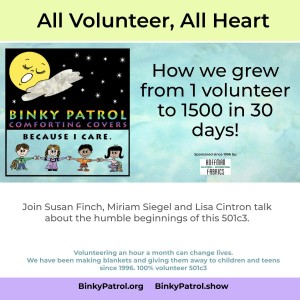
Tuesday May 10, 2022
EP1 How 501c3 Binky Patrol grew from 1 volunteer to 1500 in 30 days.
Tuesday May 10, 2022
Tuesday May 10, 2022
Hear about a spontaneous non-profit grew to a nationwide organization from three people who were there 26 years ago. Miriam talks about walking the streets – of Laguna Beach, and Lisa talks about the streets of Skid Row, and how volunteering for Binky Patrol forever changed their lives. Learn about Binky Patrol and hear the reminder about volunteering and how it can be FUN, easy and give you forever friendships. Join us for this episode of All-Volunteer, All Heart from Binky Patrol hosted by founder, Susan Finch.
Learn more about Binky Patrol at https://binkypatrol.org . We are an all-volunteer 501c3.